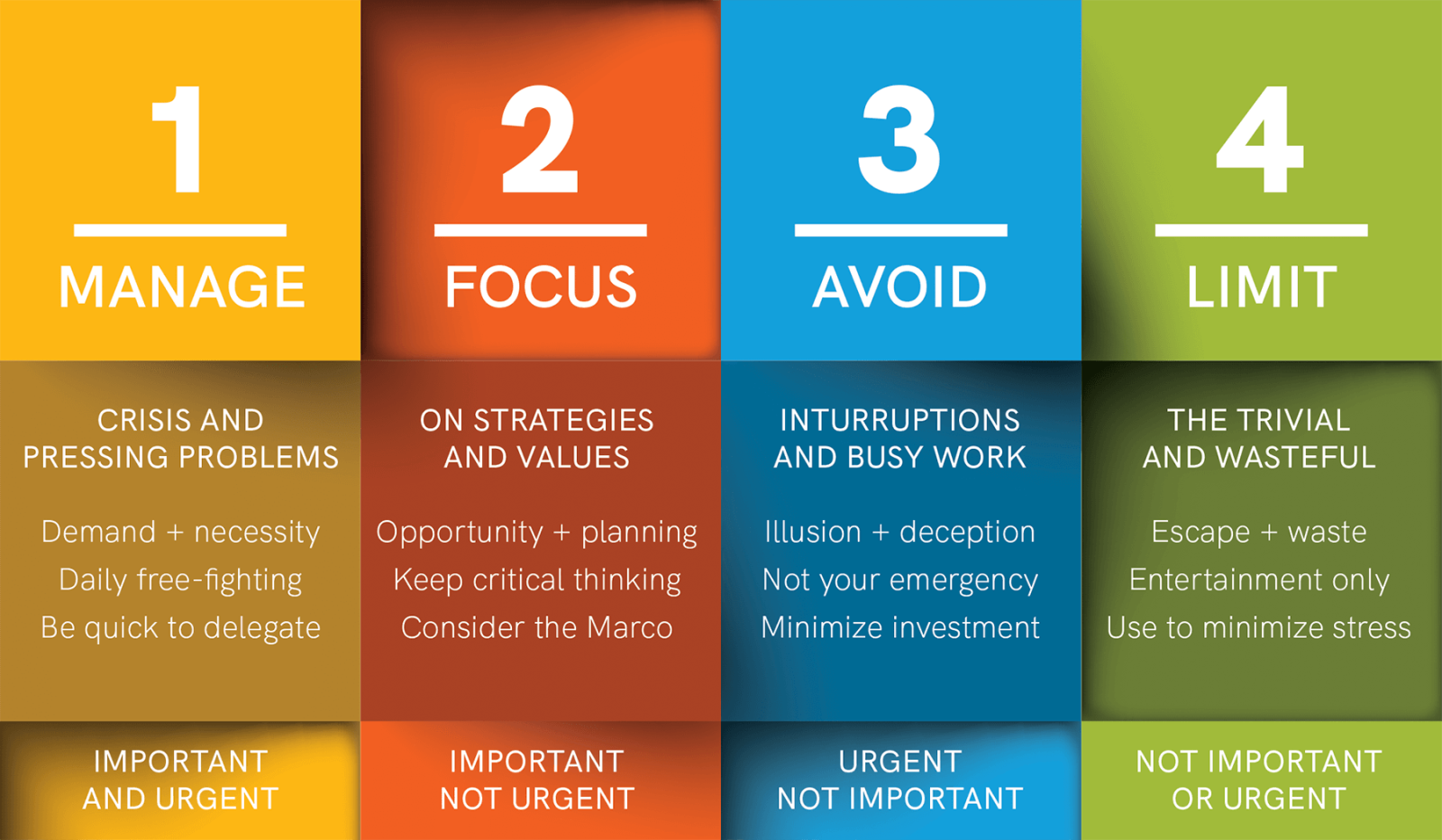 Like many small business owners, you might find yourself in the role of ‘fire chief’ and ‘solver of all crises’ more often than you’d like to admit, or even planned on when you signed up as an entrepreneur. At the end of the day, this can leave you both running on empty AND frustrated because you didn’t get to the list of things you ought to have. If you’re managing a seasonal business, you are most likely nodding your head in agreement already. If so, read on. This column is about being effective rather than being super busy.
Like many small business owners, you might find yourself in the role of ‘fire chief’ and ‘solver of all crises’ more often than you’d like to admit, or even planned on when you signed up as an entrepreneur. At the end of the day, this can leave you both running on empty AND frustrated because you didn’t get to the list of things you ought to have. If you’re managing a seasonal business, you are most likely nodding your head in agreement already. If so, read on. This column is about being effective rather than being super busy.
I’m talking about the common confusion between what is merely urgent and what is really important. To quote Dwight Eisenhower: “What is important is seldom urgent and what is urgent is seldom important.”
To clarify the difference between the two:
Urgent:
Urgent matters are those which need your immediate attention and action. They either have a visible and looming deadline, or they are a sudden and unanticipated emergency.
Important:
Important tasks are those that pursue achieving a goal or dream. They rarely have an ‘in your face’ deadline. They typically lurk in the weeds of your do list.
One of the simplest, yet most profound concepts in time management was put forward by Dwight Eisenhower, promoted by Winston Churchill and later popularized by author Stephen Covey — the Urgent-Important Matrix.
There are four quadrants formed by the combination of the words important and urgent.
Quadrant 1: Important and Urgent
- Tax filing deadline
- A crying baby
- Preparation for an important meeting
- Medical emergency
- Relationship or financial crisis
- Depression, severe anxiety, intolerable stress
In the Action Quadrant you’ll find things that affect you significantly and tasks that have to be tackled immediately.
Some of these tasks are expected urgencies caused by procrastinating until it is almost too late. Some are unexpected urgencies like a medical emergency or accident, a customer relationship turned sour, etc. This is a reactive quadrant — preventing you from being proactive. The long term effect of operating in this quadrant is burn out, making excuses, habitually blaming others, low team morale, short-sighted decisions, etc.
Quadrant 2: Not Urgent but Important
- Self-improvement: reading, research, and reflection
- Clarifying beliefs and values, crafting your dreams
- Setting your goals, priorities, and plans
- All your New Year resolutions are Quadrant 2 activities.
- Training and learning new relevant skills
- Recreation, vacation, excursion, hobbies
- Building and nurturing human relationships, networking
- Health choices, car and home maintenance, choosing proper insurance, managing savings and investments
Quadrant 2 is a ‘decision facilitator.’ It is a quadrant which prepares you for decisions by clarifying your thoughts and priorities, and it’s where you focus to engage in effective activities.
The focus of Quadrant 2 is on the end result — what is really important versus what is merely urgent. These are important matters that are not tagged as urgent. These are “sow now and reap later” activities. This quadrant gives direction and quality to our lives through fulfillment, control, fewer crises and regrets.
Quadrant 3: Urgent but not Important
- Interrupting phone calls
- Unexpected visitor
- Most emails, messages, or social media notifications
- Requests for help from others because you are mostly involved in Quadrant 4 activities
- Social activities others want you to do but that don’t align with your purpose
- Meetings, functions, ceremonies where your presence does not matter either for you or for the other
- Activities that support your ego, not your goals
I like to call this the rabbit hole quadrant. These are tasks that you just think are important. But, once you start understanding the big difference between urgency and importance you realize there are many things you often do which fit here. If some tasks here seem unavoidable, try and delegate them to others and go back to Quadrant 2. We are often mired in this quadrant because we lost sight of strategy and goals. If you have a hard time saying no, you’re likely here often. AND, if you have what I call ‘the Hero Syndrome’ (always looking for ways to be appreciated, please others or be irreplaceable), you’re here often and likely can’t see it…even reading this article.
This is a deception quadrant where you are busy, without doing anything important. People spend most of their time in Quadrant 3 thinking that they are activities of Quadrant 1. There are many activities that the ego can create as urgent. Urgent to impress, to be faster, stronger, better, smarter, more important, more successful, etc. Sooner or later, all of these become stressful and create urgencies where there are none. Relax, think and act.
Quadrant 4: Not Urgent and Not Important
- Gossip, long telephone conversations, reading junk emails, social media like WhatsApp, Facebook, Twitter, etc.
- Going down rabbit holes…getting distracted by online ads, clicking on them and getting absorbed unexpectedly
- Excessive breaks, daydreaming, interrupting others
- Mindless TV shows, video games, computer games, watching sports
- Attending lectures without introspection, or learning within your comfortable bandwidth
This is about impulsive activities. It is a quadrant of the escapists. People exhausted after dealing with urgent matters of Quadrant 1 and Quadrant 3 find solace here. Stress and boredom are big reasons for people to fall helplessly in this quadrant. The activities have no value for you or for anybody else. This is the worst quadrant to be in. This quadrant instills guilt as it is a quadrant of waste, and cause dwindling self-esteem.
People who spend time almost exclusively in Quadrant 3 and Quadrant 4 lead challenging lives. It is easy to get trapped in these quadrants if you aren’t sure about your dreams and goals. Somewhere, deep down we know how important Quadrant 2 is but we lack the awareness of importance it carries. We easily get carried away by the Quadrant 3 ‘image’ or Quadrant 4 ‘feel good’ and avoid the Quadrant 2 ‘simplicity.’
This is about clarity of thought and direction — they are of the utmost importance. Avoiding Quadrant 2 to save time will cost heavily in the long run. Most of us spend too little time in Quadrant 2 because it doesn’t shout with urgency. Try not to delude yourself by saying: “someday I will work on Quadrant 2, for now, let me do the urgent stuff.” That ‘someday’ won’t come. When we pursue what is most important to us, we will create value for ourselves, our company, and for those around us.









